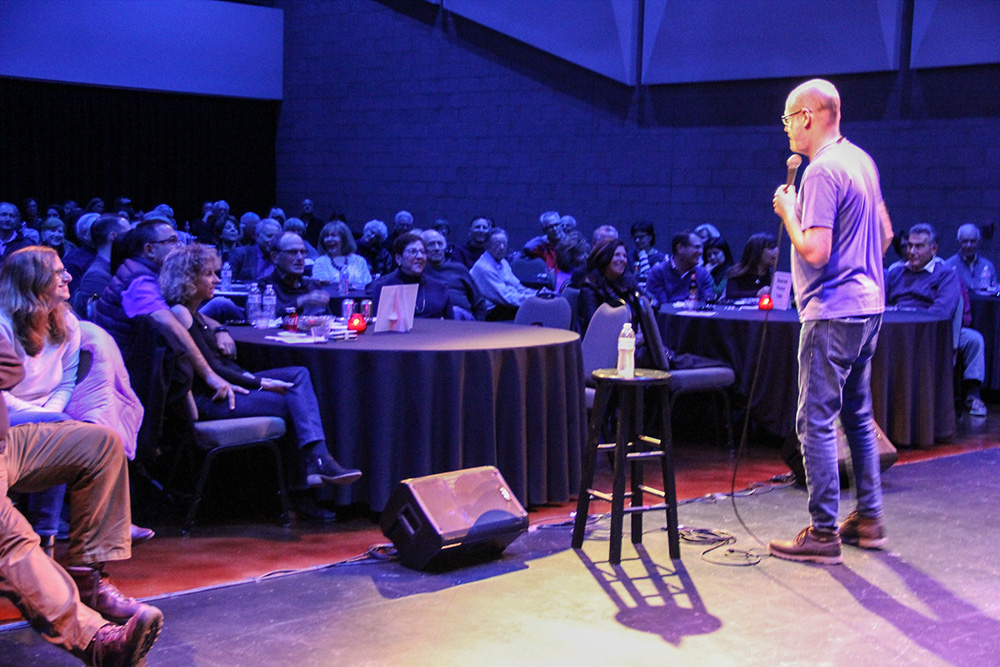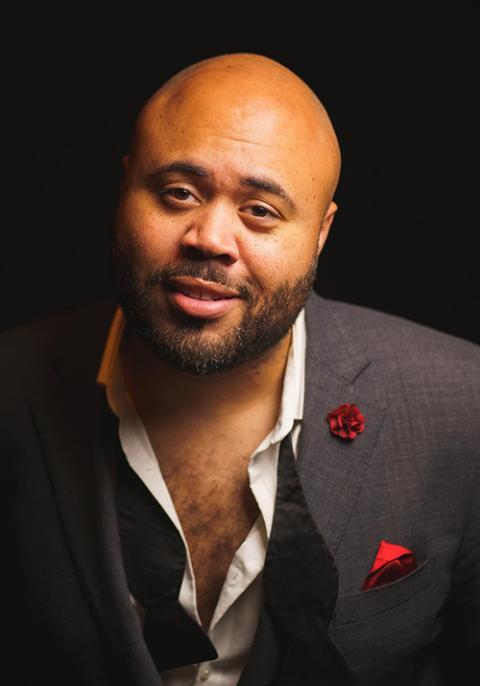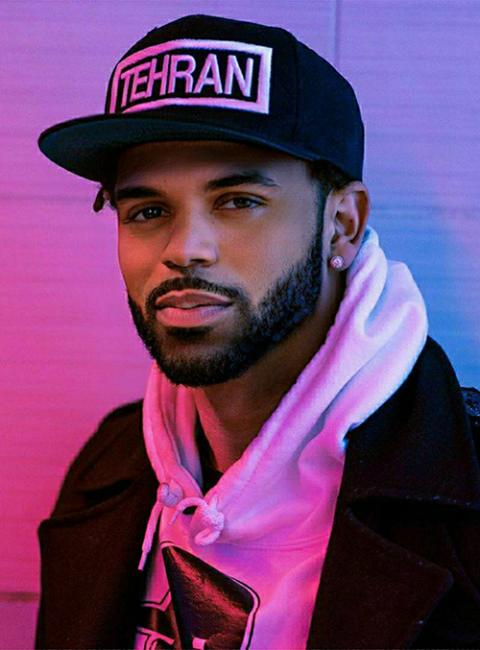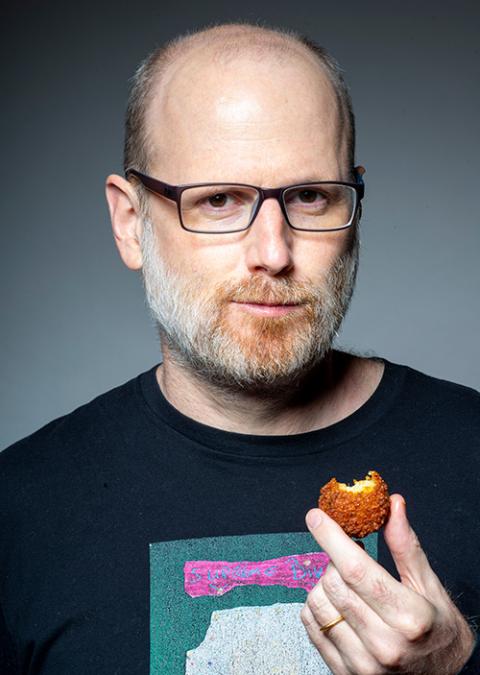
Erik Angel on stage during one of his recent standup comedy shows (Courtesy of Comedy for Peace)
When Israeli standup comedian Erik Angel launched Comedy for Peace in 2019, he was dreaming of a stage where comedians from different religious backgrounds could share laughs and stories together.
After a new wave of violence struck his home country and its neighboring communities in 2023, his project became a vital mission — proving that laughter can unite communities even in the darkest of times.
Comedy for Peace — a series of standup comedy shows uniting Jewish, Muslim and, just recently, Christian comedians — has brought together religiously diverse audiences across North America to experience the healing power of humor.
Angel's vision was born out of his own experiences as a Jewish Israeli who hadn't encountered Muslims until traveling abroad and eventually moving to New York — a realization that inspired him to create a platform for connection through comedy.
Comedy for Peace has performed in diverse venues, including college campuses, community centers and online via Zoom. The concept goes beyond comedy. It's about creating a safe, welcoming space where people can laugh together, sidestepping politics to focus on shared humanity.
It has now expanded its reach, bringing shows to more than 20 new stops across North America this fall and winter, after the Nov. 8 debut at the New York Comedy Festival.
Angel, who understands the personal impact of conflict, told NCR he finds relief and joy in his job. Following the Oct. 7, 2023, attacks in Israel and the subsequent war in Gaza and Lebanon, Angel said he struggled with whether or not to continue the shows. Eventually, he decided to press on, feeling an intensified need to counteract the surrounding pain with laughter and connection.
"I'm dealing with so much pain and frustration and sadness on a daily basis, and I'm worried. The Israeli hostage situation is driving me nuts, and I'm not worried only about my people," Angel said in a café on Manhattan's Upper West Side, scrolling through notifications about the war in Lebanon on his phone. "Comedy is saving my life."
The Comedy for Peace comedians don't just share the stage, but form a traveling community, Angel said, often spending long hours together in transit between shows. For this reason, he explained that it's essential that everyone involved is open-minded and committed to peace.

Chase DuRousseau (Courtesy of Comedy for Peace)
"I'm not accepting haters to this project. You have to be open-minded. You have to believe in the idea," he said.
"There's very little difference between a successful comedian and a successful preacher. Comedy is essentially the church of your vibe," said standup comedian Chase DuRousseau, who is joining Comedy for Peace on some of the West Coast stops — the first comedian with a Catholic background to embark on the project.
DuRousseau has spent nearly 18 years performing worldwide for American military audiences in locations like Kuwait, Iraq, Northern Africa and Japan. Raised in a culturally diverse background with both Catholic and Methodist influences, he said he feels connected to a broad range of religious communities, especially within the Catholic culture of his upbringing in Houston.
For DuRousseau, Comedy for Peace embodies a celebration of the human experience, allowing people from various backgrounds to connect and share in laughter.
"When you watch Comedy for Peace, when you watch one of these shows that Erik produces, it's like you're going to a church where it's just very welcoming," he said. "You get to see people from all backgrounds come together and celebrate each other, celebrating the human experience."
Advertisement
Tehran Von Ghasri — a standup comedian who's the son of an Iranian immigrant to the U.S. of both Muslim and Zoroastrian descent, and of an African American woman with a Jewish mother and a Christian father — brings a unique perspective to the Comedy for Peace's team. Thinking of his complex ancestry, Von Ghasri often jokes, saying, "I did Comedy for Peace well before there was Comedy for Peace."
Growing up in the Washington, D.C., area and later moving to Los Angeles, Von Ghasri said he entered comedy with a mission to bridge divides and foster unity. He sees comedy as a powerful antidote to separation, noting, "A room full of people laughing is truly laughing together."
"Two wrongs don't make a right, and an eye for an eye will leave everyone blind," he said, explaining that laughter offers a pathway to coexistence and unity.
During a Zoom interview with NCR from a hotel in Oslo, right before one of his shows, Von Ghasri shared that the toughest part of his mission entails enduring racist comments on his Instagram posts, which he receives daily.

Tehran Von Ghasri (Courtesy of Comedy for Peace)
He recalled how, during the height of the Black Lives Matter protests, he tried to talk about those comments to a friend's wife, who initially struggled to believe that racism could be so pervasive.Von Ghasri then began sending her the messages he received. Some days, there were just one or two; other days, there were dozens. She eventually became so distressed by the volume and vitriol of the comments that he stopped sharing them.
Laughing, he recounted a rare day when he hadn't received any racist messages, until 11:58 p.m., when a message finally popped up, as though it had been timed to prevent even a single day of reprieve.
Despite these daily challenges, Von Ghasri finds ways to laugh and encourages his audience to do the same. Through comedy, he channels his experiences into humor, hoping to foster understanding and empathy.
"The biggest thing we need to learn is coexistence. In this situation, it's all about coexistence," he insisted.
Comedy for Peace's performances typically end with a Q&A session, allowing audience members to engage with the performers and ask questions. Through these interactions, Angel hopes to build understanding and break stereotypes, providing a window into what peace can look like on a personal level.
"We just love being together under one roof," he said. "Different cultures, different communities, to see how easy it is to have fun together."









